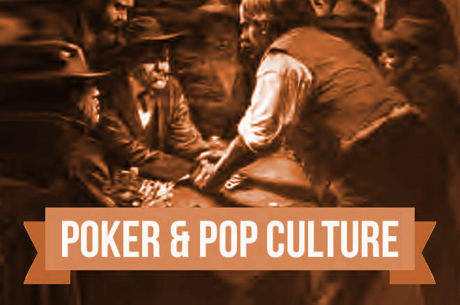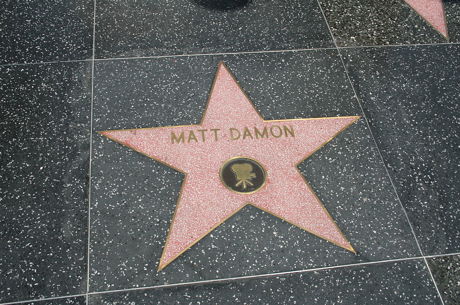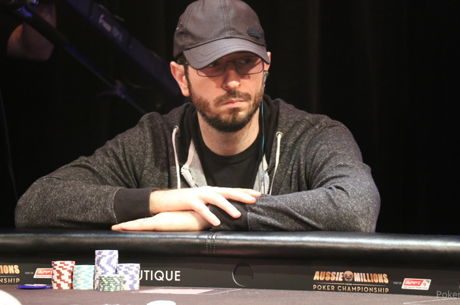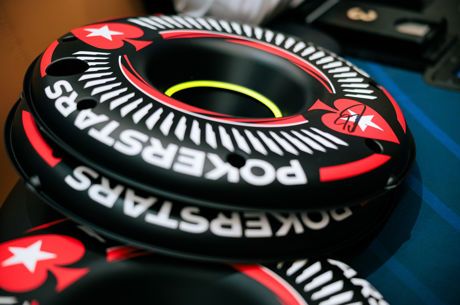Poker & Pop Culture: The Card Playing of Billy Yank and Johnny Reb
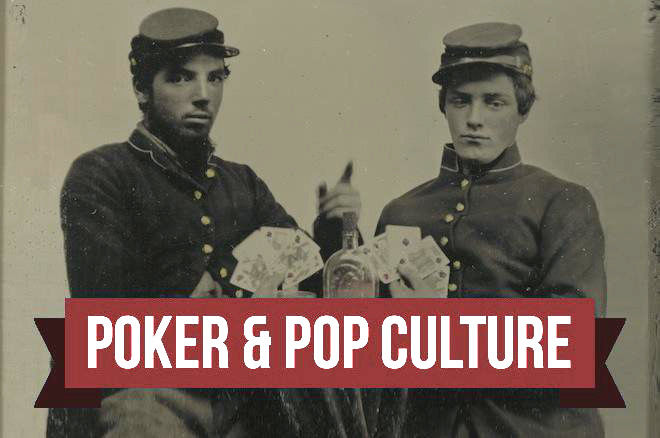
The story of poker in America begins in the south and west, but by April 12, 1861 �� the day Confederate forces fired on a Union garrison at Fort Sumter in South Carolina to launch the first battle of the Civil War �� the game had already found its way both north and east via steamboats, trains, and by other means.
The war itself would hasten the spread of the game even more, both during the four years of fighting and afterwards. Many thousands of young men on both sides would be first introduced to poker (and other gambling games) during those years.
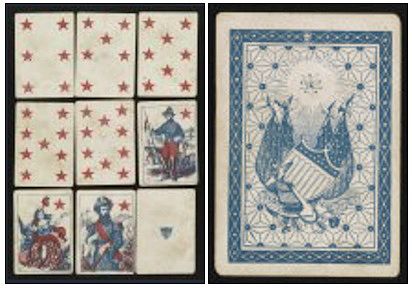
As the war turned in the North's favor, their advantage in numbers and resources would also be realized in their access to playing cards. In fact the American Card Company produced a special "Union deck" supplied to soldiers that instead of using spades, hearts, diamonds, and clubs featured eagles, shields, stars, and flags for the four suits. The king was a colonel, the queen the goddess of liberty, and the jack a major, with the backs also featuring patriotic imagery.
An excellent source of information about the daily lives of both Union and Confederate soliders is the Civil War historian Bell I. Wiley whose books The Life of Johnny Reb: The Common Soldier of the Confederacy (1943) and The Life of Billy Yank: The Common Soldier of the Union (1952) draw heavily from soldiers' diaries and letters to present a thorough, detailed understanding of the day-to-day thoughts and activities of the "rank-and-file."
The books describe various recreations pursued by those on both sides during the sometimes lengthy down times of the war. They read newspapers, novels, and, of course, the Bible. They engaged in various sports including wrestling and boxing, as well as cricket and an early version of baseball. Some sang and a few even created small theater groups to perform plays.
But gambling and card playing proved the most favored between-battle activity explains Wiley, providing a much desired escape from the pressures of more injurious forms of combat. Additionally �� like the war itself �� the betting of money on cards significantly challenged some soldiers' moral sensibilities, prompting them to reconsider individually their own judgments of what was permissible and what was not.
The Betting by the Blue
In The Life of Billy Yank, Wiley writes persuasively about the war introducing many Union soldiers to activities and behaviors in which they wouldn't otherwise participate like swearing, smoking, drinking, and, of course, card playing.
"The degeneration came from the removal of accustomed restraints and associations, the urge to experiment with the forbidden, the desire to escape boredom and the utter inadequacy of religious and recreational facilities for soldiers of the sixties," explains Wiley.
Their leader Ulysses S. Grant enjoyed poker before, during, and after the war, and many of those who served likewise embraced the game. But not everyone was as enthusiastic about the prevalence of gambling in the ranks. Some described in their diaries and in letters feelings of unease over the seeming moral laxity among their fellow soldiers.
Wiley quotes one Union soldier writing home in October 1864 and reflecting with a kind of awe just how widespread gambling on card games had become among his fellow soldiers.
"So far as my observation goes, nine out of ten play cards for money," writes the soldier.
Predictably gambling picked up shortly after paydays, with many of the lower officers risking more than they should of their $16 a month allowance. Some who brought prior experience to the games enjoyed an advantage over less tutored players. "Gambling sharks trained in metropolitan dens frequented some of the camps and on payday made heavy inroads on the meager resources of unsuspecting soldiers," notes Wiley.
There were dice games, including craps and the popular "chuck-a-luck." Soldiers also conducted raffles, engaged in cockfighting, and even horse racing.
However "the principal gambling medium was cards and the favorite game was poker, commonly called 'bluff,' which was played in several variations," Wiley reports. "Other card games included twenty-one, euchre, faro and seven-up or 'old sledge.'"
Despite the small stakes, the poker games �� usually five-card draw �� were nonetheless pursued with vigor. Wiley even shares one story of a group of Union soldiers completing a hand while being fired upon by Confederates.
The story of a young officer named C.W. Bardeen receives particular attention. Entering the army at the age of 16, Bardeen had no prior experience with gambling games, though in his diary reports winning hundreds at poker over the course of just a few weeks.
"Played Bluff as usual. Sent $50.00 home," reads one entry. "Lost $5.00 at Sweat this morning," begins another, referring to a dice game, "but won it back again at Bluff. I seem to have uniform good success at Bluff this payday." A few days after that Bardeen reports winning $20 more at Bluff: "A full hand, two Flushes. I held the Full."
However later entries find Bardeen experiencing guilty feelings about gambling, expressing the same "concern for the soul" (as Wiley puts it) as others did over poker in their diaries and letters. Like others Bardeen gives up gambling entirely, although Wiley cynically observes many who quit poker weren't so much worried about their souls as they were about their depleting funds, having been "constrained to reform by the quick loss of badly needed wages."
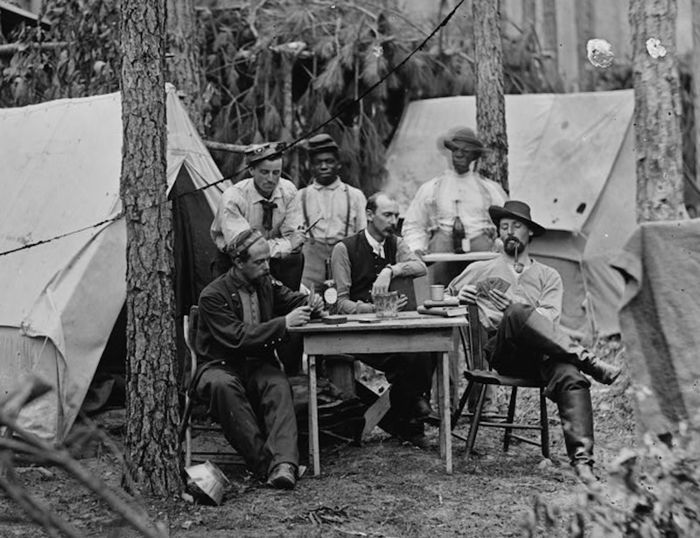
The Gambling of the Gray
Meanwhile in The Life of Johnny Reb concerns over moral objections to gambling are even more conspicuous, in some cases reflecting the position of their commander Robert E. Lee as expressed in his General Order delivered in November 1862 prohibiting gambling. However by then it was already too late, suggests Wiley, to inhibit the spread of such "sin."
"If Lee was just then discovering this propensity of his troops he was far behind time, for that evil had flourished in the Army of Northern Virginia, as elsewhere, long before he assumed command," he writes.
On the South's side more soldiers came into the war with experience playing poker and other gambling games. Wiley notes in particular soldiers from Louisiana (poker's birthplace), Tennessee, Mississippi, and Texas gambling as they traveled and already finding "innumerable games of chance already in progress" upon landing in Richmond.
Like the "nine out of ten" figure cited by a Union soldier regarding the prevalence of soldiers' gambling, a Confederate counterpart likewise observed of his fellow fighters that "a young man cannot guard himself too closely in camp... where to be considered an accomplished gentleman it is necessary to be a scientific and successful gambler."
Dice games, horse racing, and raffles were likewise popular among the soldiers of the South, and Wiley even shares stories of men betting on louse "fights" as well as on how fast lice could move off a plate.
Once again, "the commonest form of gambling was card playing," with poker, twenty-one, and euchre all popular. Wiley notes the generally poor quality of the playing cards with which the Confederate soldiers often played, especially during the war's final months. Unlike the brand new, specially designed decks used by the Union, the "cards dealt around Confederate campfires generally were as ragged and battleworn as the uniforms of the players."
Cash was also scarce, meaning they would more often bet on items like pocket knives, clothes, or even rations. "A Louisiana veteran recalled a card game late in the war in which the stake was a stolen chicken," adds Wiley.
He additionally describes the interesting phenomenon of men heading toward a battle and ridding themselves of decks of cards as they marched, something the Union soldiers also frequently did. They did so out of concern of "being killed with the instruments of sin on their bodies," which meant one could find cards strewn along the paths taken to battle "tossed aside by conscience-stricken gamblers fearful of their future" like so many discards in a larger, more fateful game.
"The immediate prospect of battle brought fear of death and the punishment of an angry God to the hearts of many gamblers," surmises Wiley.
Not surprisingly, those who survived would draw up the cards again on their return to camp, and the games would continue.
Conclusion
The card playing of Civil War soldiers was pursued with the same variety of motives others did before and after �� for profit or for fun, as a amusing diversion or with great seriousness. No matter how high the stakes were, however, they always paled in comparison to the much greater ones faced by the soldiers, hundreds of thousands of whom would perish either in combat or by starvation and disease.
After the South's surrender and President Andrew Johnson's declaration of the end of fighting on May 9, 1865, the survivors took poker back to their home states, helping spread the game further and increase its cultural impact during subsequent decades.
From the forthcoming "Poker & Pop Culture: Telling the Story of America��s Favorite Card Game." Martin Harris teaches a course in "Poker in American Film and Culture" in the American Studies program at UNC-Charlotte.
Photos: "Two unidentified soldiers in Union uniforms drinking whiskey and playing cards," "National emblems, a set of Civil War playing cards," "Officers of the 114th Pennsylvania Infantry drinking alcohol and playing cards in front of tents" via Library of Congress (public domain).
Be sure to complete your PokerNews experience by checking out an overview of our mobile and tablet apps here. Stay on top of the poker world from your phone with our mobile iOS and Android app, or fire up our iPad app on your tablet. You can also update your own chip counts from poker tournaments around ?the world with MyStack on both Android and iOS.

